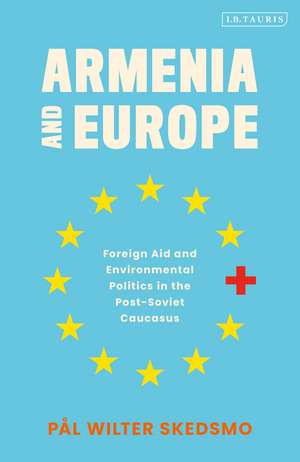Armenia and Europe: Foreign Aid and Environmental Politics in the Post-Soviet Caucasus
Autor Pål Wilter Skedsmoen Limba Engleză Paperback – 19 mai 2021
| Toate formatele și edițiile | Preț | Express |
|---|---|---|
| Paperback (1) | 158.88 lei 3-5 săpt. | +14.14 lei 4-10 zile |
| Bloomsbury Publishing – 19 mai 2021 | 158.88 lei 3-5 săpt. | +14.14 lei 4-10 zile |
| Hardback (1) | 658.52 lei 6-8 săpt. | |
| Bloomsbury Publishing – 13 noi 2019 | 658.52 lei 6-8 săpt. |
Preț: 158.88 lei
Nou
Puncte Express: 238
Preț estimativ în valută:
30.41€ • 31.63$ • 25.10£
30.41€ • 31.63$ • 25.10£
Carte disponibilă
Livrare economică 25 martie-08 aprilie
Livrare express 08-14 martie pentru 24.13 lei
Preluare comenzi: 021 569.72.76
Specificații
ISBN-13: 9780755636525
ISBN-10: 075563652X
Pagini: 280
Dimensiuni: 138 x 216 x 20 mm
Greutate: 0.32 kg
Editura: Bloomsbury Publishing
Colecția I.B.Tauris
Locul publicării:London, United Kingdom
ISBN-10: 075563652X
Pagini: 280
Dimensiuni: 138 x 216 x 20 mm
Greutate: 0.32 kg
Editura: Bloomsbury Publishing
Colecția I.B.Tauris
Locul publicării:London, United Kingdom
Caracteristici
Essential reading for policy makers involved in aid and environmental policy
Cuprins
PrefaceAcronyms and abbreviationsIntroduction1 Development and 'transition' in Armenia: Contexts and concepts2 Transparent Environment: 'Helping' countries into a 'pan-European' legal space3 Save Teghut!4 LOG-framing: Donor legitimation and unattainable project goals5 'Never mind, it's not a good idea'ConclusionIndexAppendix 1: Excerpt from the Aarhus Convention textAppendix 2: Statement from Teghut ConferenceNotes
Recenzii
Armenia and Europe is unique in the anthropological literature of the post-Soviet region for its focus on multi-lateral environmental governance and for its close-up view of the workings of a bilateral technical assistance project focused on this issue. Skedsmo's effective combination of concepts from postsocialist studies, postcolonial studies and anthropological theorizations of global governance illuminates the significance of transnational networks and networking for understanding environmental struggles in Armenia and the importance of European norms in them. The book is important reading for scholars and development practitioners concerned with how and why activists and officials engage with globally circulating environmental norms.
